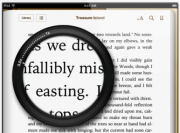I live in a tech bi-lingual household. My girlfriend uses an iPhone and an iPad, I use an Android phone and tablet. It worked for us. We were both content with things the way they were. She had her stuff and I had mine and we'd each politely nod and smile when the other felt compelled to show off some cool feature or app for his or her preferred platform.
That all changed when we got her one of the new iPads. She doesn't read tech blogs so she wasn't concerned that her new toy maybe ran slightly hotter than her old one, or that maybe it took longer to charge while she was fast asleep. She never noticed these things. What she noticed (and loved) was that new Retina display.

Trouble is, I noticed it too. And I coveted it. And then I swore I wouldn't upgrade my Android tablet until I could get a similar display. That display really is gorgeous and literally easy on the eyes. But my tablet is closing in on 18 months old. How long will I have to wait? Suddenly I'm tempted to switch sides and get an iPad of my own. [Disclaimer: I do have a first generation iPad which I enjoyed while I waited for manufacturers to get their Android tablets out to market.]
Now there are some Android devices coming down the pike that come close to the Retina display's 2048-by-1536/264 PPI specs. Asus has a new version of the Transformer Prime, the 700T, that has a 1920 by 1200/224 PPI display, for example. That'd be a big step-up for me, considering my Acer A500 has a 149 PPI display. (Back when I was shopping for my first Android tablet I didn't even think about PPI; now I'm obsessed with it!)
The problem is that I don't just have to wait for an Android device to ship with a high pixel density screen. I have to wait for most Android devices to have this kind of screen. Otherwise I don't see app developers putting the extra effort into creating high density assets just to please a fraction of the Android-using audience.
We saw this issue when the first Android tablets hit the market. There was a long lag time before many app developers, used to building apps for Android phones, supported the tablet form factor (some would argue that we're still working towards that point). There are a lot of different Android tablets being sold. When just one or two of them have high density screens, no one is going to bother supporting them.

Of course the operating system of these tablets will support the displays, so text will still be crisp and awesome. Images and video in apps are where we'll have a problem.
So what's the solution? Is there a solution beyond waiting a few years for the majority of Android hardware to catch up?
Well, there've been a lot of rumors about Amazon working on new Kindles lately. I haven't been paying much attention to them because they've been based on info from Digitimes which, in my experience, isn't a very reliable source. But last Tuesday, TechCrunch reported the same rumor from a different source (China Economic News Service), so maybe it's the real deal.
If so, then Amazon is planning an 8.9" Kindle Fire with a 1920x1080 display which works out to about 248 PPI (according to the formulas on this Wikipedia page since my memory of geometry is severely atrophied). Amazon might be the only Android tablet manufacturer with enough clout to get app developers to support the new high density displays.
If this rumor turns out to be just a rumor then our only hope is that Google somehow steps in and starts taking a more Apple-like approach to hardware. Maybe they come up with a requirements document (including a high density screen) and then create a "Google Certified" program or something. But that kind of flies in the face of what Android is all about and I'm not holding my breath on this one.
In the end, I just don't know what's going to happen. I only know that I've been spoiled by that Retina display and my Android tablet (and for that matter, my iPad 1) now look pretty chunky in comparison. And oh, as long as I'm whining, how long until I have have a nice 250 PPI, 24" monitor sitting on my desk?
Read more of Peter Smith's TechnoFile blog and follow the latest IT news at ITworld. Follow Peter on Twitter at @pasmith. For the latest IT news, analysis and how-tos, follow ITworld on Twitter and Facebook.

For more computing news, visit ITworld. Story copyright ? 2011 ITworld Inc. All rights reserved.
lindsay lohan playboy cover shooting at virginia tech shooting at virginia tech harry morgan john lennon death john lennon death c.j. wilson
No comments:
Post a Comment
Note: Only a member of this blog may post a comment.